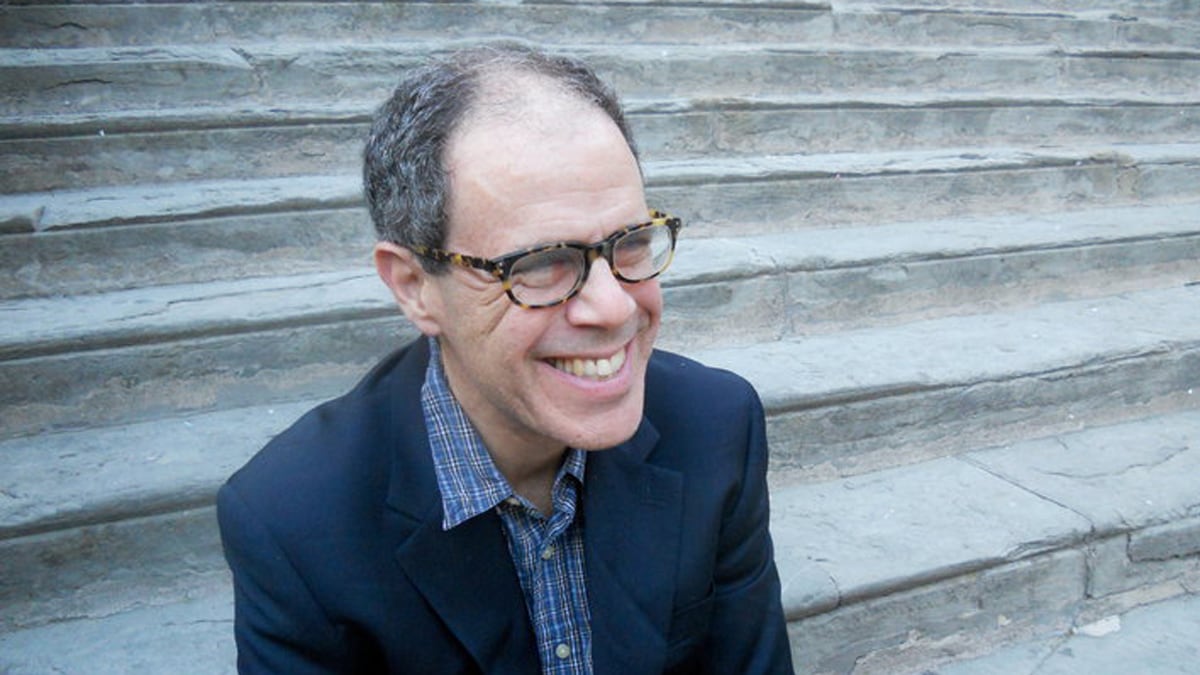What’s your morning routine like?
If it’s a teaching day, I get in the car first thing and drive 29 miles to Newark, Delaware, home of my employer, the University of Delaware. If not, I shamble to my third-floor office and stew in my own juices till I manage to accomplish something, even if it’s only a Facebook post ranting about a bad movie I saw the previous night. I try to go from that to something less negligible, and so on up the line.

What is a distinctive habit or affectation of yours?
Affected, moi? For some reason, the thing that comes to mind is that I’m fanatical about using the word “farther” (instead of “further”) for anything that connotes distance, even metaphorical, e.g., “He took it a step farther.”
Tell me about one of the common grammatical errors that you’ve come across during your years of teaching, and which you discuss in your new book.
Most of the writing problems I encounter in my teaching, and which I discuss in the book, don’t actually involve grammar, but rather errors in spelling and punctuation, and such usage issues as wordiness, flat sentences, clichés and jargon, vagueness, and poor word choice. Sort of a combination grammar and punctuation problem, is what I call the “however comma splice.” For example: “I was expecting a party, however the house was empty.” My students seem to really want to use “however” as a conjunction—more or less a synonym for “but.”
I’m a bit self-conscious now, wondering if I’ve made any errors in preparing these questions for you…
Ah! You were perfect until the very end of that last sentence, when you unaccountably used ellipses instead of a period!
I occasionally edit English translations of Slovene texts, to help out colleagues, and find that there are very consistent errors made by native speakers of Slavic languages, when writing or speaking in English. Do you find that non-native English speakers, depending on their native language, tend to make the same group of errors in English as do native English speakers? Or do the common errors differ between native speakers and non-native speakers?
Most of the non-native English speakers I encounter tend to be writers or teachers. Not surprisingly, they are more into “correctness” and the rules than Americans tend to be. A Facebook friend of mine is Italian, and teaches literature at a U.S. college. When she heard that the title of my book is How to Not Write Bad, she was shocked, shocked that I would split an infinitive and use “bad” as an adverb!
In linguistics, scholars discuss written- versus spoken-language paradigms. In principle, the more correct way to speak is the way that we should write—in complete sentences, grammatically correct, etc. But in practice, many of us write the way we speak. What are your thoughts on this?
In my opinion, the best writing has some of the qualities of conversation; and, in fact, my favorite short piece of writing advice is “read it aloud.” When my students write—either in a scholarly, journalistic or essayistic mode—it’s almost as if they’re cowed, or intimidated, by the expectations they perceive. They end up writing stiffly and borderline pretentiously, using a fancy word like “reside,” when the simpler “live” is stronger and better.
I’m reading Faulkner’s As I Lay Dying, and I’m struck by how many writing rules Faulkner breaks, in order to place us in the minds of his varied, under-schooled characters. It seems to work for him, but it is dangerous for an author to choose to write in a sort of dialect that must be picked at by the reader. Is there a separate set of rules for writers attempting to write in a dialect or unusual voice, or are all rules thrown out the window, in that case?
My feeling is that because dialect is hard to do well, and can quickly become distracting (or even offensive), a little of it goes a very long way. If one of your characters (in fiction or nonfiction) has a distinctive accent or way of saying certain words, it’s better to take a sentence or two to describe this, and then go back to regular spelling. The exception that proves the rule is someone like Faulkner or Tom (not Thomas) Wolfe who, in his classic piece on the stock-car driver Junior Johnson, not only quotes his Carolina characters as using the phrase “good ole boy,” but picks it up himself and makes it the leitmotif of the article.
How do you deal with incorrect grammar that is now universally used and understood? For example, “How are you doing?” to which many reply “Good,” when the correct response is “Well.”
The way I deal with it is not to deal with it at all, but to go on to the next thing we have to say to each other. It’s obnoxious to correct someone you’re having a conversation with, don’t you think? Of course, if a student makes a significant grammatical error in an assignment, I correct it.
The Internet age changed the way we write, introducing new terms, abbreviations, and a sort of shorthand to fit text messages, tweets, and massive amounts of email. Has this, in turn, changed the way we write in a more formal sense?
Weirdly, not very much, in my experience. That is, I almost never encounter students who write “U” instead of “you” or use smiley faces or abbreviations like “LOL.” They realize that’s the wrong register for a college assignment. However, the online revolution has had other effects, most of them not so hot. For one thing, it’s so darned easy to create shapely and professional-looking paragraphs. Back in the days when you had to scratch out each character with a quill pen (or even pound a manual typewriter), words were dearer and therefore were parceled out more judiciously. Now, after some stream-of-consciousness keyboarding, you’ve got something that looks impressive. But unless you’re a Mozart-level stone genius, it isn’t.
Describe your writing routine, including any unusual rituals associated with the writing process, if you have them.
Whenever I am writing something—a tweet, a blog post, a review, an essay, or a book chapter—I will periodically stop and fetishistically go over what I’ve done so far, obsessively grooming it (you started this by using the word “ritual”) so that any imperfection is removed. One unintended result is that if I’m writing a book chapter, the first paragraph will have been gone over, say, 1,000 times, the second paragraph 999, and so on, until the very last paragraph, which gets just a single once-over. (I imagine that this is true, to some degree, of most writers: their beginnings are more polished than their endings. But I’ve never seen a critic comment on the phenomenon.)
Is there anything distinctive or unusual about your workspace? Besides the obvious, what do you keep on your desk? What is the view from your favorite workspace?
It is constantly in a state of needing to be cleaned up.
A paperweight that my mother gave me; it is made of dark blue glass and is in the shape of a heart. A thermometer and a battery-charge tester. I am deeply interested in measuring things.
The view is of my next-door neighbor’s chimney and the eastern end of Parrish Road, which features many trees.
What is something you always carry with you?
The New York Public Library access card I used when I was writing About Town: ‘The New Yorker’ and the World It Made.
What is the story behind the publication of your first book?
I wanted to write a biography, and spent more than a year trying to find a person who interested me, and hadn’t been done recently and well. I don’t remember when the name “Will Rogers” entered my consciousness, but after it did, I found that he satisfied both criteria. I learned that Rogers’s papers were in Claremore, Oklahoma, and I arrived there on a day so hot the heat visibly rose off the asphalt around the Best Western motel I was staying at. The curators at the Will Rogers Memorial let me browse around a little bit, and on that first day I came across a letter from Charles Lindbergh to Rogers, advising him to stay away from “single-engine planes.” I knew that less than 10 years later, Rogers would die when the single-engine plane he was flying in crashed. I had found my subject.
What advice would you give to an aspiring author?
How much and how widely you read will be more or less directly proportional to your ability and range as a writer.
What is your next project?
A book about (nonrock) American popular songs and songwriting from the late 1940s through the early ‘60s.
I also conduct a blog about British expressions (like “bits” and “went missing”) that have become popular in American English.






